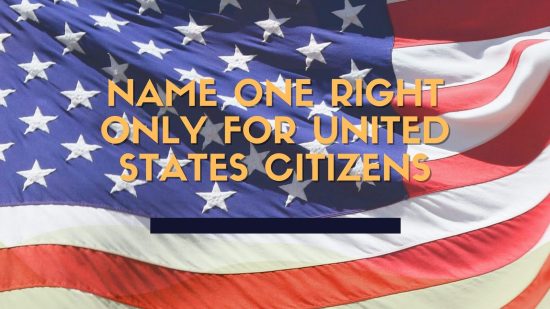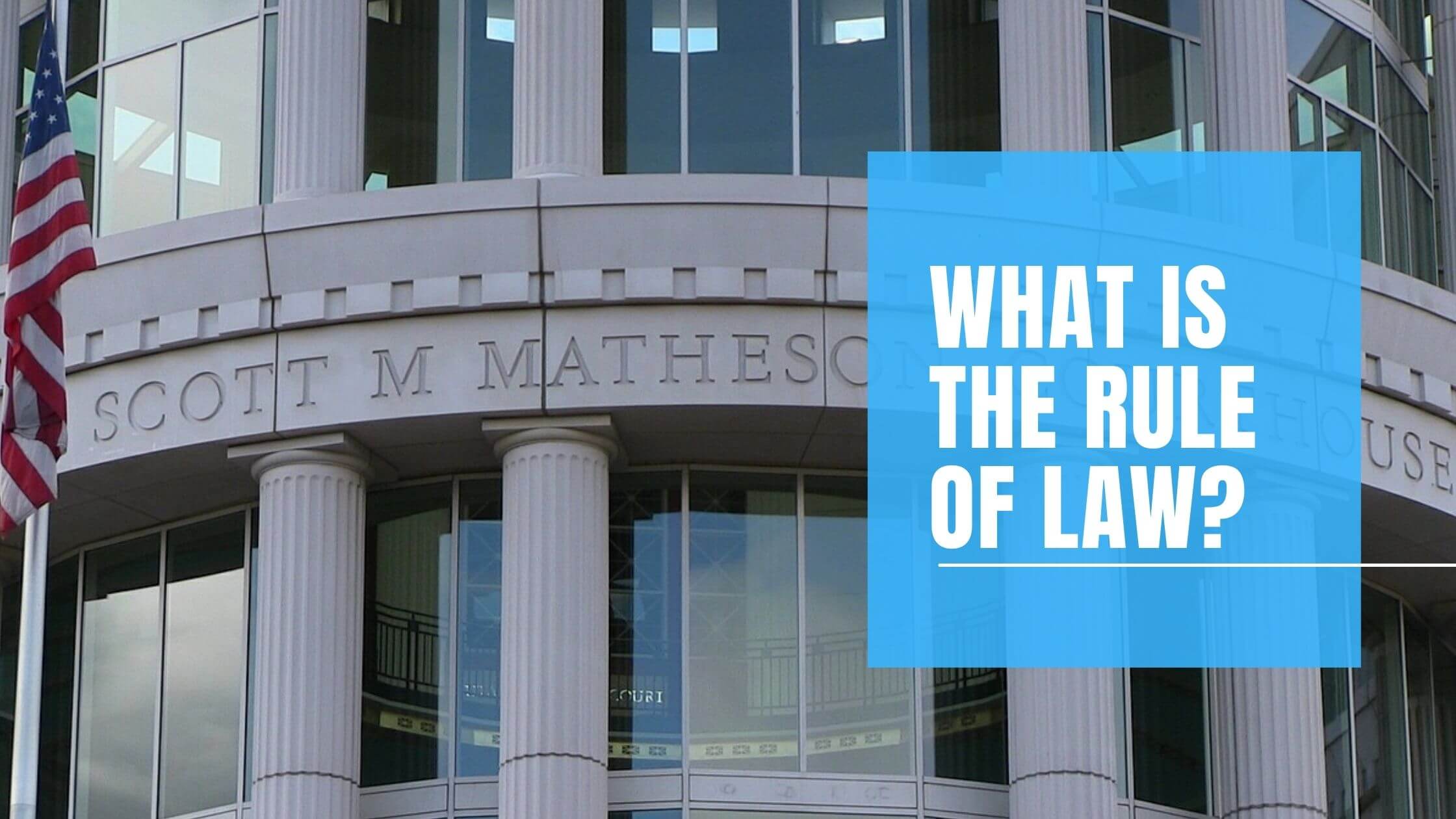Name one right only for United States citizens.
Acceptable Answers:
vote in a federal election
run for federal office
This question is about understanding the difference between rights and freedoms and between the people of the United States and United States citizens.
We always hear about the inherent right for all to enjoy “life, liberty, and the pursuit of happiness.” But, this is quite vague, which is partially why the Bill of Rights was so essential.
So, what are the citizens’ and the people’s rights?
Rights for United States Citizens Only
Rights for a United States citizen include the following:
- The right to vote
- The right to run for elected offices such as president or vice president
- The right to apply for federal employment and for the federal government
- The right to obtain a United States passport
- The right not to be denied re-entry into the United States.
The right to vote and run for office are listed above because they are the two aspirational rights.
Many living in the United States may dream of being elected officials or even running for President of the United States.
But unless they have citizenship, they can’t even vote for one.
The final two examples relate to immigration law.
All citizens have the right to obtain and use a United States passport to travel out of the country.
Furthermore, this gives them the right to cross back onto American soil at a checkpoint without being refused entry.
Immigrants and those on visas do not have this same freedom of movement.
What About Puerto Rico’s Voters?
This is where there is a discrepancy in the rules over the rights of United States citizens. The people of Puerto Rico are granted birthright citizenship, giving them many of the same rights and responsibilities as those granted citizenship in the 50 states.
However, they can’t vote in federal elections unless they move to one of those states with representation in the Electoral College.
It is one of the examples where the American territories don’t always get a fair deal. For example, those born in American Samoa are not recognized as United States citizens.
Immigrants Earn Rights if They Become Citizens
These stand out compared to other rights and freedoms because they do not apply to anyone without citizenship.
Those who don’t get these rights are residents without citizenship, such as those on visas or immigrants who haven’t completed the naturalization process and become naturalized US citizens.
However, they get many rights just by being in the country.
Rights for All People of the United States
While some rights only apply to those with American citizen status, many more freedoms are offered to everyone in the United States, even without citizenship.
The term people has changed in definition since the days of the framers of the Constitution. Back then, people didn’t mean everyone, and the unwritten assumption was that the freedoms of the Constitution applied to the white male colonists rather than any slaves, natives, immigrants, or even women.
Over time, this changed with the Bill of Rights so that everyone would have the same rights as citizens and equal protection under the supreme law of the land.
There is sometimes the assumption that these rights don’t apply to immigrants as they haven’t yet “earned” them by taking the test or having a birthright.
But this isn’t the case. This was established as early as 1898 with the case of United States v. Wong Kim Ark.
The Supreme Court determined that the term “person,” as stated under the Fifth Amendment, did apply to immigrants.
That case was followed by the Fong Yue Ting v. United States ruling that Chinese laborers were entitled to the same protections.
The Rights of All People in the Bill of Rights
The Bill Of Rights extends to everyone in the United States, whether they are citizens born and raised, naturalized, here on visas, or simply visiting.

Get Smarter on US News, History, and the Constitution
Join the thousands of fellow patriots who rely on our 5-minute newsletter to stay informed on the key events and trends that shaped our nation's past and continue to shape its present.
This is essential so that the laws in any situation can protect everyone.
For example, a tourist or immigrant should have the same legal rights and fundamental freedoms while in the country as one with citizenship.
This also applies across all states.
The Bill of Rights came about after critics of the United States Constitution felt that there were too many unexpressed freedoms.
The additional document started with ten amendments that determined the rights of the people in more detail. These still apply today to all those in the country. They include the following.
The 1st Amendment:
To protect basic freedoms, such as the freedom of speech, freedom of religion, freedom of the press, and freedom of peaceful protest.
This means that immigrants cannot face persecution for being of different faiths and that non-citizens can speak out on issues like those with united states citizenship.
The 2nd Amendment:
The right to bear arms. This clause allows gun ownership to protect themselves and their property.
The 5th Amendment:
As seen in the case of Chinese laborers, this allows for fair treatment under the law. More specifically, it also talks about protecting against self-incrimination and double jeopardy.
The 6th Amendment:
This takes legal matters further with the right to a fair trial by an impartial jury and the right to seek legal counsel. Again, this is important for all people of the United States and not just with citizenship.
The 9th Amendment:
A catch-all clause that reserves any rights not explicitly mentioned in the Constitution. This one allows for the potential for more unwritten civil rights and leads to important Supreme Court rulings over what is and isn’t unconstitutional.
Additional Rights for United States Citizens
In short, there are a few rights that you only get when you are born a U.S. citizen or become one. But that doesn’t mean that everyone else lacks fundamental rights and freedoms.
The Bill of Rights applies to all. However, you earn the benefits of voting rights, standing for office, and getting a passport if you become a naturalized citizen.
Name One Right Only for United States Citizens Quiz
Frequently Asked Questions
What are some rights exclusive to United States citizens?
Can residents of Puerto Rico vote in federal elections?
Do immigrants and non-citizens have any rights under the U.S. Constitution?
What was the significance of the United States v. Wong Kim Ark case?
What does the 9th Amendment of the U.S. Constitution cover?
How useful was this post?
Click on a star to rate it!
Average rating / 5. Vote count:
No votes so far! Be the first to rate this post.
We are sorry that this post was not useful for you!
Let us improve this post!
Tell us how we can improve this post?







